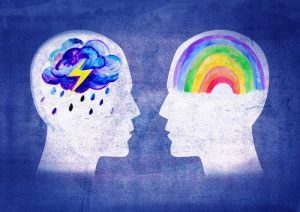What Is Ecpathy?


Written and verified by the psychologist Gema Sánchez Cuevas
Ecpathy is a new term to complement empathy, which allows the appropriate handling of emotional contagion and induced feelings. Doctor and psychiatry professor J.L. Gonzalez coined the term to define the voluntary process of excluding feelings, attitudes, thoughts, and motivations induced by others.
However, ecpathy isn’t the same thing as the indifference or emotional hardness characteristic of people lacking empathy. On the contrary, it’s a maneuver or positive mental action that compensates empathy. It’s not a mere lack of empathy. This compensatory mental action protects us from emotional floods and prevents others’ emotions from dragging us down, which is a risk that excessively empathetic people take.
From this point of view, you shouldn’t confuse putting yourself in another person’s shoes with installing ourselves in another person’s place. Somehow, this empathetic journey is necessary to be able to understand, but it can also be really dangerous when we get stuck in the other person’s place.
“If the degree of involvement of a person who’s disposed to an empathic attitude with another is not correct, there’s a risk of falling into what is called the trap of the Messiah: loving and helping others while forgetting to love and help ourselves.”
-Carmen Berry-
Ecpathy against manipulation
Although we think that there are people who specialize in inducing and transmitting emotions, the truth is that we’re not defenseless. We have or can acquire enough tools so that this emotional “kidnapping” doesn’t happen. In this regard, it’s an emotional kidnapping in which the kidnapped’s special sensitivity keeps them in this state, although this isn’t what the kidnapper intended. In this sense, we don’t have to confuse emotional contagion with empathy.
Empathy deals with the valuable information we receive from others. If we only take into account other people’s points of view, desires, and emotions, coexistence becomes disastrous. However, empathy is incomplete without the ability to manage emotional contagion and compensate for it through another mental quality.

While empathy involves “putting oneself in another person’s shoes”, ecpathy means “putting oneself in one’s shoes.” Both qualities are necessary. The latter is the mental action that protects us from manipulation or emotional flooding, preventing other people’s emotions from dragging us down.
“Empathy is an affective response more appropriate to another’s situation than one’s own.”
-Martin Hoffman-
The balance of emotions between empathy and ecpathy
Daniel Goleman, the author of the book Emotional Intelligence, says that empathy is basically the ability to understand others’ emotions in others’ circumstances. However, he also pointed out that, at a deeper level, it’s about defining, understanding, and reacting to the concerns and needs that underlie the responses and emotional reactions of others.
Ecpathy is opposite and, at the same time, complementary to empathy. This voluntary process helps us stop the emotional contagion overdose in situations such as caring for sick people or humanitarian crises so that we don’t end up blocking the pain. It also helps us avoid mental manipulation or even mass hysteria.

Therefore, not all emotional contagion is good. With regard to our emotional health, ideally we would be able to regulate our empathetic capacity not only in the sense of enhancing our ability to understand, but also in the sense of preventing or limiting the extension of this experience when it can be detrimental to the empathetic person.
“When people talk, listen completely. Don’t be thinking what you’re going to say. Most people never listen.”
-Ernest Hemingway-
This text is provided for informational purposes only and does not replace consultation with a professional. If in doubt, consult your specialist.








